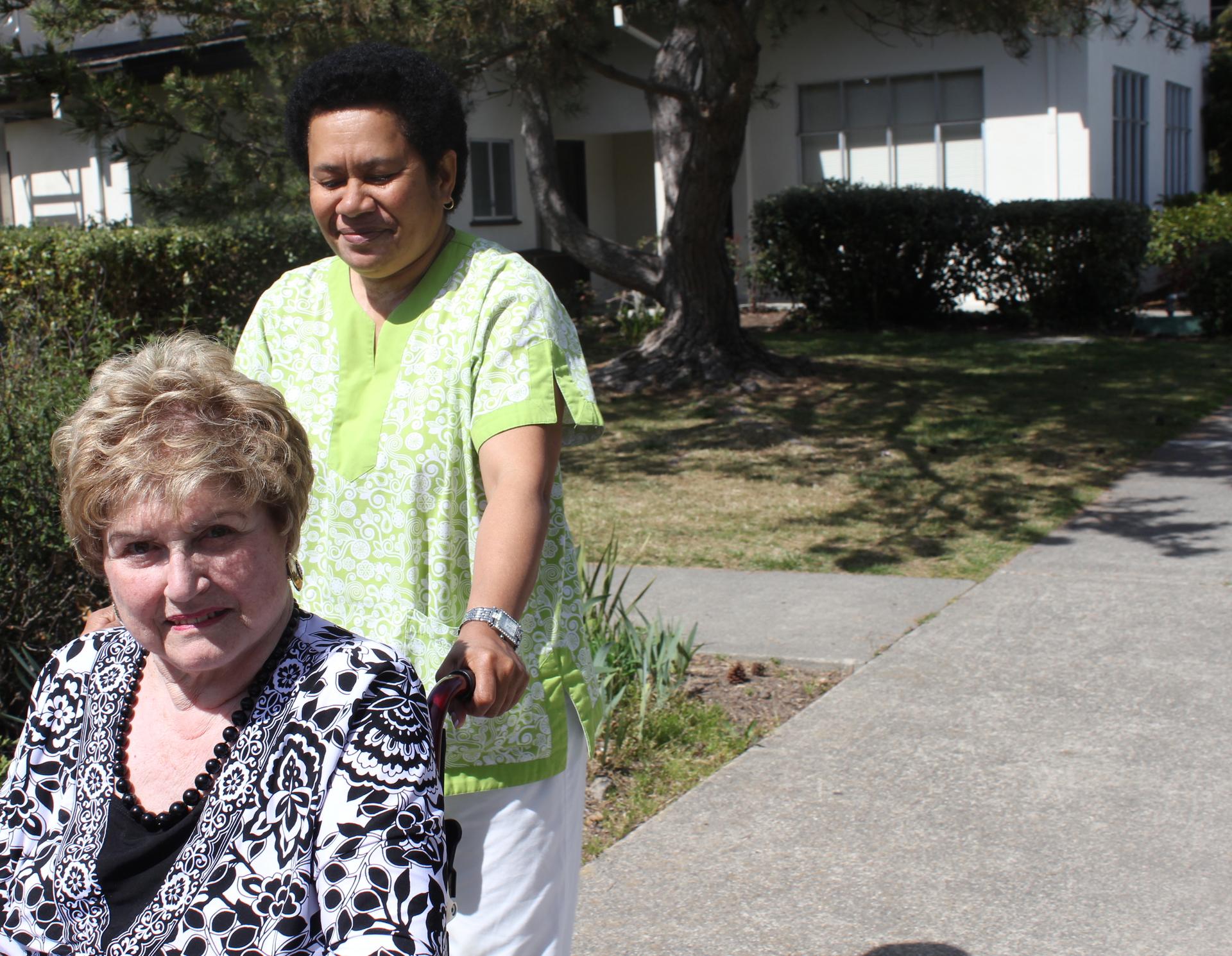An Undocumented Immigrant Caregiver Shares Her Story
Live-in caregiver Joesy Gerrish, from Fiji, with her employer Florence Tratar, who had an accident that left her in a wheelchair. (Photo: Monica Campbell)
Nannies, housecleaners, caregivers—they are sometimes called the world’s most invisible workforce. In the US alone, it’s estimated that more than 2 million people do this type of work. Most are women and many are immigrants. And pressure is growing to address their working conditions. As part of our Global Nation coverage, The World’s Monica Campbell has our first piece in a series about domestic workers. It looks at a home aide from Fiji, her elderly employer, and a short documentary called "The Caretaker" highlighting these intimate partnerships.
A few years ago, Florence Tratar fell down. In her 80s, it was enough of a spill to change her life drastically and leave her bound to a wheelchair. And with no family nearby, she needed someone to move in and care for her immediately.
But nobody she hired clicked, until she found Joesy Gerrish, a caregiver from Fiji.
“I liked her right away,” says Tratar. So once Gerrish’s references checked out, she was hired and moved in to help Tratar full time. It’s easy to see why Tratar picked Gerrish. In her early 40s, she is energetic, has a quick laugh, and says she treats her employers like family.
Now, Gerrish gets up early every morning, makes Tratar’s meals, drives her to appointments.
“I do everything!” Gerrish says.
“Everything!” Tratar agrees. “I mean, whatever I have to do, Joesy does.”
I met Tratar and Gerrish in Sebastopol, California, north of San Francisco. The two women had ventured out to see a short documentary about Gerrish. The film, by San Francisco-based director Theo Rigby, shows how immigrant caregivers increasingly fill a demand in the United States to attend to the disabled and elderly.
The documentary shows Gerrish cooking and shopping for a previous employer, an ailing Japanese woman. She feeds her, turns her over so she won’t get bed sores. It’s non-stop work.
After the film, Tratar realized how little she knew about Gerrish’s life: How she misses Fiji—and how she’s in the US without legal authorization.
“This is a shock to me because I just didn’t know,” Tratar says.
She’s against hiring people without papers, she says. But she also can’t say why she never asked Gerrish for documentation. Maybe because she didn’t want to know, she says, because Gerrish was a good fit.
Meanwhile, Gerrish says she doesn’t worry about stepping out of the shadows so publicly. She tells Tratar how she’s hoping immigration reform might grant her legal status.
“It’s getting there,” Gerrish tells Tratar. “It’s a long journey but we’ll get there.”
Gerrish also tells Tratar how, in her off time, she is working to improve labor conditions for other caregivers, nannies and housekeepers. In California, it’s estimated that some 200,000 people do this type of work, many without papers.
She talks about women from Mexico she knows, along with other immigrants from elsewhere, who live in the US illegally and worry about getting deported on their way to work. Also, Gerrish says, she hears about women worried about getting paid, since they are off the books. If there is a dispute with an employer, wages can be held back and undocumented workers can be aware that they still have the right to claim wages.
“Oh, there’s a lot of that, getting paid under the table. A lot!” Tratar exclaims.
“Yes,” Gerrish says, “but that’s the only kind of work that we can do. We would like to do other stuff. But we’re stuck with that.”
Gerrish says she has felt mistreated by other employers.
“Oh, you’re like a slave,” she says. “Do this. Do that. Do that. I say, ‘Wait a minute, I only have two hands.’ But they want you right there, right there, right there. Otherwise, I’ll kick you out. But you have to do it. Otherwise what else can you do? You need to survive.”
Gerrish is working with labor advocate Maureen Purtill, who organizes immigrant women at the Graton Day Labor Center nearby, in Sonoma. Purtill remembers Gerrish's reaction when she told her that, among other demands like overtime and vacation, they’d push for workers to get uninterrupted sleep.
“She burst into laughter, in this uncomfortable laughter, like, ‘Oh, I would love that. That would be amazing. I’ve never had the right to sleep five hours in a row, or eight hours in a row,” says Purtill. “Caregiving requires sometimes, you know, care every two hours if you’re caring for elderly people.”
It’s the case with Gerrish, who wakes up with Florence Tratar at 4:00 or 5:00 a.m. every day.
“Oh my goodness gracious, you need domestic help,” says Tratar. “I don’t know what I would do without Joesy. I couldn’t survive.”
Tratar hopes that Gerrish will legalize her status in the US soon. She understands now that deportation is a constant worry for her caretaker.
“Everyday you live in fear, just looking behind your shoulder every day,” Gerrish says.
The question now is whether new legislation would let both women rest a little easier.
Our coverage reaches millions each week, but only a small fraction of listeners contribute to sustain our program. We still need 224 more people to donate $100 or $10/monthly to unlock our $67,000 match. Will you help us get there today?
